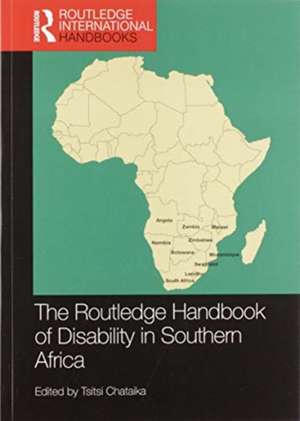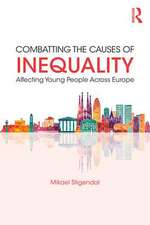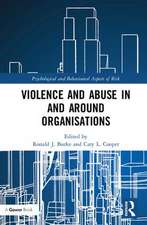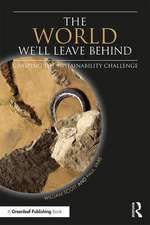The Routledge Handbook of Disability in Southern Africa
Editat de Tsitsi Chataikaen Limba Engleză Paperback – 30 iun 2020
This handbook provides a body of interdisciplinary analyses suitable for the development of disability studies in southern Africa. Through drawing upon and introducing resources from several disciplines, theoretical perspectives and personal narratives from disability activists, it reflects on disability and sustainable development in southern Africa. It also addresses a clear need to bring together interdisciplinary perspectives and narratives on disability and sustainable development in ways that do not undermine disability politics advanced by disabled people across the world. The handbook further acknowledges and builds upon the huge body of literature that understands the social, cultural, educational, psychological, economic, historical and political facets of the exclusion of disabled people.
The handbook covers the following broad themes:
• Disability inclusion, ICT and sustainable development
• Access to education, from early childhood development up to higher education
• Disability, employment, entrepreneurship and community-based rehabilitation
• Religion, gender and parenthood
• Tourism, sports and accessibility
• Compelling narratives from disability activists on societal attitudes toward disability, media advocacy, accessible housing and social exclusion.
Thus, this much-awaited handbook provides students, academics, practitioners, development partners, policy makers and activists with an authoritative framework for critical thinking and debates that inform policy and practice in incomparable ways, with the view to promoting inclusive and sustainable development.
| Toate formatele și edițiile | Preț | Express |
|---|---|---|
| Paperback (1) | 283.48 lei 6-8 săpt. | |
| Taylor & Francis – 30 iun 2020 | 283.48 lei 6-8 săpt. | |
| Hardback (1) | 1343.36 lei 6-8 săpt. | |
| Taylor & Francis – 26 iul 2018 | 1343.36 lei 6-8 săpt. |
Preț: 283.48 lei
Preț vechi: 336.75 lei
-16% Nou
Puncte Express: 425
Preț estimativ în valută:
54.24€ • 55.96$ • 45.27£
54.24€ • 55.96$ • 45.27£
Carte tipărită la comandă
Livrare economică 26 martie-09 aprilie
Preluare comenzi: 021 569.72.76
Specificații
ISBN-13: 9780367580599
ISBN-10: 0367580594
Pagini: 386
Dimensiuni: 174 x 246 mm
Greutate: 0.71 kg
Ediția:1
Editura: Taylor & Francis
Colecția Routledge
Locul publicării:Oxford, United Kingdom
ISBN-10: 0367580594
Pagini: 386
Dimensiuni: 174 x 246 mm
Greutate: 0.71 kg
Ediția:1
Editura: Taylor & Francis
Colecția Routledge
Locul publicării:Oxford, United Kingdom
Public țintă
Postgraduate and UndergraduateCuprins
Part 1: Disability Inclusion and Sustainable Development 1. Introduction: Critical Connections and Gaps in Disability and Development 2. Leave No One Behind: Disability Mainstreaming in Action 3. Reflections on the Development of the National Disability Mainstream Plan in Lesotho 4. Theatre for Development: Bringing Disabled Students’ Hidden Transcripts out of the Closet 5. Building Sustainable Communities: Why Inclusion Matters in the Post-Conflict Environment 6. Experiences of Disabled People in Using Information and Communication Technology in Mozambique Part 2: Access to Education 7. Personal Reflections of Disabled Women on Access to Early Childhood Education in Zimbabwe 8. Educating Deaf Children in Mainstream and Special Secondary School Settings: Inclusive Mirage or Reality? 9. Using the International Classification of Functioning, Disability and Health Model in Changing the Discourse of Disability to Promote Inclusive Education in Zambia 10. Examining the Effectiveness of the Special Class Model in Zimbabwe Part 3: Inclusion in Higher Education 11. When Rights are Discretionary: Policy and Practice of Support Provision for Disabled Students in Southern Africa 12. Access, Equality and Inclusion of Disabled Students within South African Further and Higher Educational Institutions Part 4: Disability, Employment, Entrepreneurship & CBR 13. Community-Based Rehabilitation for Inclusive Social Development in Southern Africa 14. Employment, Entrepreneurship and Sustainable Development Issues in Southern Africa 15. Enhancing Realistic Hopes and Aspirations towards Vocational Choices: Focus on Deaf Secondary Students in Zimbabwe Part 5: Religion, Gender and Parenthood 16. The ‘Unholy Trinity’ against Disabled People in Zimbabwe: Religion, Culture and the Bible 17. Addressing Disability and Gender in Education Development: Global Policies, Local Strategies 18. Socio-economic Barriers faced by Women with Disabilities in Zimbabwe 19. Disability, Intimacy and Parenthood: Deconstructing ‘Mutually Exclusive’ Constructs Part 6: Tourism, Sports and Accessibility 20. Disability and Tourism in Southern Africa: A Policy Analysis 21. State and Status of Wheelchair Basketball Facilities in Zimbabwe 22. Mobile Outreach Seating Clinics: Improving Access to Wheelchair and Support Services Part 7: Narratives from Disability Activists 23. A Citizen of Two Worlds 24. Disability Advocacy through Media: Action Power 25. Disability Advocacy in Action: Why I Built an Accessible House in Zimbabwe 26. The Security Guard who turned the Lawyer into A Disability Activist 27. ‘For I know the Plans that I have for you’: the Story of my Life 28. Concluding Remarks and Future Direction
Notă biografică
Tsitsi Chataika is the editor of this handbook and also a senior lecturer in inclusive education in the Department of Educational Foundations, University of Zimbabwe. She is an ardent supporter of disability rights. Chataika’s research interests allow her to understand how disability intersects with education, gender, religion, childhood studies, poverty, policy, development and postcolonial theory. Her goal is to promote inclusive sustainable development, hence influencing policy and practice. She conducts disability awareness and mainstreaming workshops in various African countries. Chataika has presented at various national and international platforms and she has also published widely in her areas of research interests.
Recenzii
'This much needed expansive text pulls in perspectives from activists, researchers, academics, lawyers and practitioners from health, the arts and education in order to centralise disability concerns in Southern Africa. While this book marks a significant turn - from the Global North to the Global South in disability studies - its important contributions will be felt across many national spaces when readers take seriously the sophisticated and unashamedly politicised analyses presented throughout the text. A significant, original and rigorous collection of work' - Dan Goodley, Professor of Disability Studies and Education, the University of Sheffield
‘The contributors present a wide range of perspectives: disabled people, disability activists, academics, not-for profits. Many are from the region (mainly Zimbabwe, South Africa and Zambia but Botswana, Malawi, Tanzania, Swaziland, Lesotho are also represented), but there are also global perspectives from USA, Finland and Norway, making this a truly international collection with an African focus. This essential book establishes a context for disability studies in southern Africa and will be of use to academics, practitioners and activists in the region who are concerned with disability inclusive development' – Associate Professor Judith McKenzie, Division of Disability Studies, University of Cape Town
'This is a landmark contribution to Disability Studies in Southern Africa. Drawing upon experts and advocates from throughout the region, this well-edited volume provides breadth and depth to understanding an important range of political, socio-economic and psychological concerns of people living with disabilities, their families and their communities. This book should be on the shelf of anyone working on disability in Southern Africa – but just as importantly - with 15% of the world’s population now living with a disability, this volume should be read and shar
‘The contributors present a wide range of perspectives: disabled people, disability activists, academics, not-for profits. Many are from the region (mainly Zimbabwe, South Africa and Zambia but Botswana, Malawi, Tanzania, Swaziland, Lesotho are also represented), but there are also global perspectives from USA, Finland and Norway, making this a truly international collection with an African focus. This essential book establishes a context for disability studies in southern Africa and will be of use to academics, practitioners and activists in the region who are concerned with disability inclusive development' – Associate Professor Judith McKenzie, Division of Disability Studies, University of Cape Town
'This is a landmark contribution to Disability Studies in Southern Africa. Drawing upon experts and advocates from throughout the region, this well-edited volume provides breadth and depth to understanding an important range of political, socio-economic and psychological concerns of people living with disabilities, their families and their communities. This book should be on the shelf of anyone working on disability in Southern Africa – but just as importantly - with 15% of the world’s population now living with a disability, this volume should be read and shar
Descriere
It is currently estimated that there are at least 80 million people affected by some form of disability in Africa. This book addresses a clear need to bring this issue to the fore, as it combines a range of interdisciplinary and theoretical perspectives on the topic of disability and sustainable development in Southern Africa.








